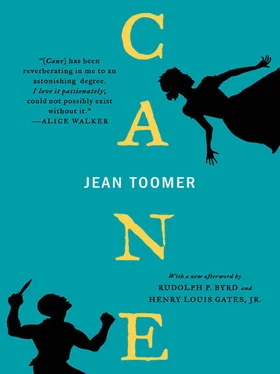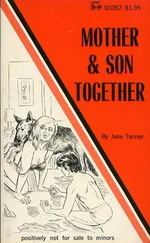A scraping sound, like a piece of wood dragging over the ground, is coming near.
“Ha, ha. The ghosts down this way havent got any chains to rattle, so they drag trees along with them. Thats a good one. But no joke, something is outside this house, as sure as hell. Whatever it is, it can get a good look at me and I cant see it. Jesus Christ!”
Kabnis pours water on the flames and blows his lamp out. He picks up a poker and stealthily approaches the outside door. Swings it open, and lurches into the night. A calf, carrying a yoke of wood, bolts away from him and scampers down the road.
“Well, I’m damned. This godam place is sure getting the best of me. Come, Ralph, old man, pull yourself together. Nights cant last forever. Thank God for that. Its Sunday already. First time in my life I’ve ever wanted Sunday to come. Hell of a day. And down here there’s no such thing as ducking church. Well, I’ll see Halsey and Layman, and get a good square meal. Thats something. And Halsey’s a damn good feller. Cant talk to him, though. Who in Christ’s world can I talk to? A hen. God. Myself…I’m going bats, no doubt of that. Come now, Ralph, go in and make yourself go to sleep. Come now…in the door…thats right. Put the poker down. There. All right. Slip under the sheets. Close your eyes. Think nothing…a long time…nothing, nothing. Dont even think nothing. Blank. Not even blank. Count. No, mustnt count. Nothing…blank…nothing…blank…space without stars in it. No, nothing…nothing…
Kabnis sleeps. The winds, like soft-voiced vagrant poets sing:
White-man’s land.
Niggers, sing.
Burn, bear black children
Till poor rivers bring
Rest, and sweet glory
In Camp Ground.
2
The parlor of Fred Halsey’s home. There is a seediness about it. It seems as though the fittings have given a frugal service to at least seven generations of middle-class shop-owners. An open grate burns cheerily in contrast to the gray cold changed autumn weather. An old-fashioned mantelpiece supports a family clock (not running), a figure or two in imitation bronze, and two small group pictures. Directly above it, in a heavy oak frame, the portrait of a bearded man. Black hair, thick and curly, intensifies the pallor of the high forehead. The eyes are daring. The nose, sharp and regular. The poise suggests a tendency to adventure checked by the necessities of absolute command. The portrait is that of an English gentleman who has retained much of his culture, in that money has enabled him to escape being drawn through a land-grubbing pioneer life. His nature and features, modified by marriage and circumstances, have been transmitted to his great-grandson, Fred. To the left of this picture, spaced on the wall, is a smaller portrait of the great-grandmother. That here there is a Negro strain, no one would doubt. But it is difficult to say in precisely what feature it lies. On close inspection, her mouth is seen to be wistfully twisted. The expression of her face seems to shift before one’s gaze — now ugly, repulsive; now sad, and somehow beautiful in its pain. A tin wood-box rests on the floor below. To the right of the great-grandfather’s portrait hangs a family group: the father, mother, two brothers, and one sister of Fred. It includes himself some thirty years ago when his face was an olive white, and his hair luxuriant and dark and wavy. The father is a rich brown. The mother, practically white. Of the children, the girl, quite young, is like Fred; the two brothers, darker. The walls of the room are plastered and painted green. An old upright piano is tucked into the corner near the window. The window looks out on a forlorn, box-like, whitewashed frame church. Negroes are gathering, on foot, driving questionable gray and brown mules, and in an occasional Ford, for afternoon service. Beyond, Georgia hills roll off into the distance, their dreary aspect heightened by the gray spots of unpainted one-and two-room shanties. Clumps of pine trees here and there are the dark points the whole landscape is approaching. The church bell tolls. Above its squat tower, a great spiral of buzzards reaches far into the heavens. An ironic comment upon the path that leads into the Christian land…Three rocking chairs are grouped around the grate. Sunday papers scattered on the floor indicate a recent usage. Halsey, a well-built, stocky fellow, hair cropped close, enters the room. His Sunday clothes smell of wood and glue, for it is his habit to potter around his wagon-shop even on the Lord’s day. He is followed by Professor Layman, tall, heavy, loose-jointed Georgia Negro, by turns teacher and preacher, who has traveled in almost every nook and corner of the state and hence knows more than would be good for anyone other than a silent man. Kabnis, trying to force through a gathering heaviness, trails in behind them. They slip into chairs before the fire.
Layman: Sholy fine, Mr. Halsey, sholy fine. This town’s right good at feedin folks, better’n most towns in th state, even for preachers, but I ken say this beats um all. Yassur. Now aint that right, Professor Kabnis?
Kabnis: Yes sir, this beats them all, all right — best I’ve had, and thats a fact, though my comparison doesnt carry far, y’know.
Layman: Hows that, Professor?
Kabnis: Well, this is my first time out—
Layman: For a fact. Aint seed you round so much. Whats th trouble? Dont like our folks down this away?
Halsey: Aint that, Layman. He aint like most northern niggers that way. Aint a thing stuck-up about him. He likes us, you an me, maybe all — its that red mud over yonder — gets stuck in it an cant get out. (Laughs.) An then he loves th fire so, warm as its been. Coldest Yankee I’ve ever seen. But I’m goin t get him out now in a jiffy, eh, Kabnis?
Kabnis: Sure, I should say so, sure. Dont think its because I dont like folks down this way. Just the opposite, in fact. Theres more hospitality and everything. Its diff — that is, theres lots of northern exaggeration about the South. Its not half the terror they picture it. Things are not half bad, as one could easily figure out for himself without ever crossing the Mason and Dixie line: all these people wouldnt stay down here, especially the rich, the ones that could easily leave, if conditions were so mighty bad. And then too, sometime back, my family were southerners y’know. From Georgia, in fact—
Layman: Nothin t feel proud about, Professor. Neither your folks nor mine.
Halsey (in a mock religious tone): Amen t that, brother Lay man. Amen (turning to Kabnis, half playful, yet somehow dead in earnest). An Mr. Kabnis, kindly remember youre in th land of cotton — hell of a land. Th white folks get th boll; th niggers get th stalk. An dont you dare touch th boll, or even look at it. They’ll swing y sho. (Laughs.)
Kabnis: But they wouldnt touch a gentleman — fellows, men like us three here—
Layman: Nigger’s a nigger down this away, Professor. An only two dividins: good an bad. An even they aint permanent categories. They sometimes mixes um up when it comes t lynchin. I’ve seen um do it.
Halsey: Dont let th fear int y, though, Kabnis. This county’s a good un. Aint been a stringin up I can remember. (Laughs.)
Layman: This is a good town an a good county. But theres some that makes up fer it.
Kabnis: Things are better now though since that stir about those peonage cases, arent they?
Layman: Ever hear tell of a single shot killin moren one rabbit, Professor?
Kabnis: No, of course not, that is, but then—
Halsey: Now I know you werent born yesterday, sprung up so rapid like you aint heard of th brick thrown in th hornets’ nest. (Laughs.)
Kabnis: Hardly, hardly, I know—
Halsey: Course y do. (To Layman) See, northern niggers aint as dumb as they make out t be.
Читать дальше











